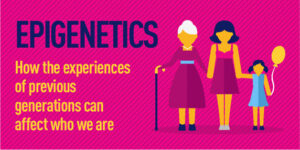The Truth About Epigenetics
By Amber Lowry
 We’ve all been there: a trip to the doctor ends with a diagnosis and a prescription for something you can’t pronounce. You might even be told that genetics are to blame for your diagnosis and that the rest is out of your control. While it is true that genetics can leave you predisposed to developing certain conditions, a budding field of science known as epigenetics has shown that there may be more to genes than previously thought.
We’ve all been there: a trip to the doctor ends with a diagnosis and a prescription for something you can’t pronounce. You might even be told that genetics are to blame for your diagnosis and that the rest is out of your control. While it is true that genetics can leave you predisposed to developing certain conditions, a budding field of science known as epigenetics has shown that there may be more to genes than previously thought.
The promise of epigenetics suggests that we have a degree of control over our gene expression as opposed to our genes having absolute control over us.
Modern science is showing that our genes may possibly exist as a set of programs that wait for environmental signals to express themselves. Sure, you may be predisposed to a condition, but a predisposed status does not mean that you will inevitably develop said condition. Your genes may simply be waiting for environmental signals to express that condition, but here’s the kicker: you are largely in control of your environment! This is where leading a healthy lifestyle comes into play. External factors such as the food you eat, the air you breathe, the cosmetic products you use, your exercise regimen and many other areas of your life control whether a gene is activated or remains inactive. While there are many environmental influences that are often out of our control such as air pollution, it’s vital that we make the best out of every controllable environmental aspect in order to promote the healthy expression of our genes.
A 2008 article published in the Springer Pharmaceutical Journal states that only 5-10% of cancers are directly linked to genetics.
The article goes on to state that the other 90-95% of cancers can be attributed to lifestyle conditions including cigarette smoke, alcohol consumption, nutrition, exercise, stress and environmental pollutants. This research is just a small piece of a larger picture suggesting that we are making ourselves sicker despite all the modern innovations we’ve been told are the keys to good health.
Please note that no one is explicitly blaming you for every negative diagnosis you receive. While there’s a lot we still don’t understand about external influences on health, making the most out of what we do know is crucial in the pursuit of longevity.
In a world so medically and technologically advanced, how can life expectancy be at the lowest it’s been in 20 years? Exploring epigenetics further, we can attempt to understand why toxic gene expression is on the rise and what more we can do to control it.






